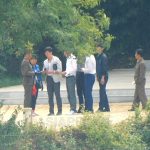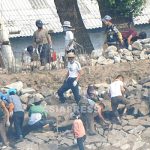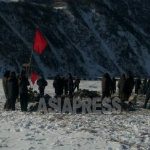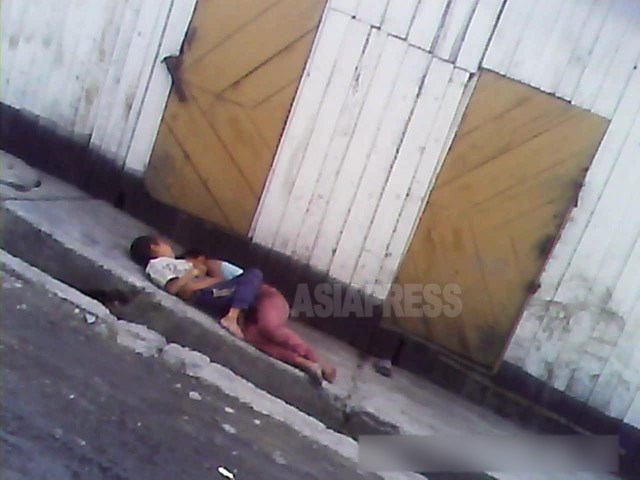
ASIAPRESS is receiving continuous reports from provincial cities that many people are dying of starvation. After 2021, deaths occurred in some areas of the DPRK’s vulnerable class, including the elderly and the sick, but the situation inside the country has clearly become worse. The information ASIAPRESS is receiving is very specific. This is the third installment of a series on the subject that focuses on the situation in Hyesan, Yanggang Province. Three reporting partners in the area provided reports in mid-May. (KANG Ji-won / ISHIMARU Jiro)
◆ A survey conducted in Hyesan
Hyesan is located next to the Yalu River on the border with China. It is the provincial seat of Yanggang Province and has an estimated population of 200,000 people. Hyesan is located in a mountainous area and is not suitable for farming due to severe cold snaps; however, it has long been a significant center of trade with Changbai Prefecture in China’s Jilin Province, which had allowed it to boast high living standards. After the onset of the COVID-19 pandemic in January 2020, however, North Korea shuttered its borders, eliminating all cross-border trade. The government slapped heavy restrictions on movement between different regions, causing a major shock to people’s lives.
Reports provided by reporting partners “B,” “C” and “D” were similar to each due to the fact they live in the same city; however, we have not summarized their reports. We used Chinese smartphones smuggled inside North Korea to communicate with them.
◆ Four people died of starvation in May
―― What is the living situation like in Hyesan these days?
B: Since the “barley period” started, there has been an increase in the number of people facing poverty and suffering from malnutrition. There are also people who are suffering from anemia due to malnutrition and can’t go outside. Since the start of May, our neighborhood watch unit has suffered four deaths. They all died of malnutrition, but the authorities said they died of disease, despite that being the same thing. There are a lot of people suffering from tuberculosis due to malnutrition. There has also been a dramatic rise in wandering homeless people. It’s a very serious situation.
―― Farm mobilizations are at their height these days. Is that having an impact on the situation?
B: My neighborhood watch unit is organizing farm mobilizations what seems like every day and, recently, people’s lives have gotten so difficult that only 20 percent of the unit’s members are participating in the mobilizations. People are fighting with whatever they have to survive, but market commerce doesn’t make any money, and people are too weak to engage in wage labor. (Weak) people are dying.
※ Starting every mid-April, urban dwellers nationwide are mobilized to work on farms.
※ Neighborhood watch units (inminban) are the lowest administrative units in North Korea. They typically manage 20-30 households in a particular area. Inminban leaders relay orders from local district offices to residents and are also in charge of keeping a close eye on the (ideological) tendencies shown by ordinary people.
※ People earn day wages from working at construction sites, collecting firewood, or transporting goods. The authorities crackdown on anyone organizing such activities, however.
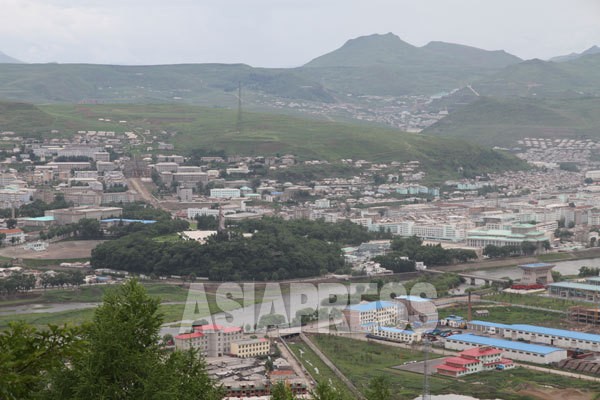
◆ The government hands out military rations, but it is still not enough
―― How is the government responding to the increase in starvation?
B: The authorities are cracking down hard on people who leave their assigned workplaces without permission, but there are so many people unable to go to work because of life’s difficulties that the authorities are loosening their crackdowns on people not showing up for work.
The authorities are saying that food aid will arrive from China, but it will take time for it to arrive in our area, so the government is releasing military rations first. In April, some companies were supplied with military rice, but each person only got 3-5 kilograms. How can anyone survive a month on that? Market commerce is also a no-go. People are now saying that they need to “avoid dying of starvation and find any way to survive.”
―― What about the markets?
B: Given it is the farm mobilization period, markets are only open from 6 PM to 8 PM, but market commerce is so bad these days that not many people work at the markets. Even food sellers are facing intensified monitoring of their sanitary conditions, making it impossible to make money.
※ People make bread, rice cakes or corn noodles at home and sell them at markets.
Food sellers have to submit sanitary confirmation certificates to market management offices. These certificates are issued by hospitals and must be stamped by neighborhood watch units in order for holders to sell food at markets. If someone fails to get confirmation they didn’t come down with COVID-19 or another infectious disease, they can’t sell food. The authorities are particularly harsh toward people suffering from hepatitis and tuberculosis. The certificate can be created through bribes, but anyone caught signing off on a false certificate can face issues, so people are cautious about doing that.
◆ Slight loosening of ban on food sales in markets
―― This year, there was a ban slapped on the sale of food displayed at market stalls. What’s the situation now?
B: The complete ban on rice and corn was recently loosened a bit recently to allow very small amounts of food to be sold. The problem is that there are few places for buyers to purchase food, and prices are set at those established by market management offices, so many sellers are shifting to selling from their homes instead of markets. At the markets, they only sell small amounts of food made at home, up to 10 kilograms. People can’t even think of selling in large quantities because roaming market patrols and local police officials conduct regular patrols.
※ These roaming patrols are made up of civilians who crack down on undesirable behavior and violations of established rules.
◆ The authorities treat starvation deaths as deaths by disease
―― Has anyone died of starvation around you?
C: The food situation is really serious. People have died. There is one person who died in my neighborhood due to malnutrition. I heard that the household didn’t even have one grain of salt. After the funeral, there was no casket available, so the corpse was placed in a burlap bag and carried away.
There’s been an increase in beggars, and there’s a lot of people who are on the verge of dying. The authorities don’t say that people have died of starvation. Death certificates say that people have died of tuberculosis, asthma, and hepatitis, not starvation.
※ Civil servants and cadres may be reporting that deaths are due to disease rather than starvation due to fear that they could get into trouble. When a large number of deaths occurred last summer due to COVID-19, civil servants and doctors rarely reported that people died of COVID-19.
―― What is the government doing about people who are starving?
C: Local doctors are going to the houses of people suffering from edema due to malnutrition and giving them IVs. However, people are getting sick because they can’t eat, so what good would IVs do?
―― What is resulting from the increase in starving people?
C: There’s been a rise in empty houses in my neighborhood. There’s a lack of food, so people are taking time from work to buy food, but who knows? There’s a lot of people who head to farming areas to get food, but the farming areas are also facing difficulties.
◆ Some people strip bark off pine trees for food
D: Recently, there’s people stripping bark off pine trees to sell. One kilogram of bark that has undergone one stage of processing goes for 700 won (around 104 South Korean won). There’s a lot of a people buying this bark up. Forestry officials are cracking down on people taking bark off trees, so they have to do it secretly. There’s also households that buy the pine tree bark on credit because they don’t have 700 won. That shows how serious the situation is.
The bark becomes similar to rice cakes after you place it in water along with ash and boil it before squeezing all the moisture from it. There were a lot of people who ate the bark from trees during the mass famine in the late 1990s.
―― That sounds serious. How are people trying to overcome these challenges?
D: There’s a lot of people who are transporting goods, collecting firewood, or doing odd jobs to buy money, all to earn enough to eat just one more meal. Everyone is in the same boat now, so the authorities aren’t cracking down that much on non-socialist behavior or jobless people. That’s because all those caught in crackdowns are just suffering from lack of food. There’s nothing to be done. Trade with China has reopened, so there’s goods in the markets, but few people are buying because there’s no money available.
Laborers are suffering so much that, starting from May, companies started giving them time to take off work so they can go out and purchase food.
※ Trade with China reopened in earnest from late last year in Sinuiju and Nampo, leading to an increase in Chinese products that had disappeared from markets. We will talk in more detail about markets and state-run “grain shops” in the next installment.
※ Starting in April, the authorities started cracking down hard on people leaving their assigned jobs and people who missed work, calling their behavior “non-socialist.” Starting in March, the authorities are forcing people to line up every morning and commute to work in groups.
※ ASIAPRESS communicates with its reporting partners through Chinese cell phones smuggled into North Korea.
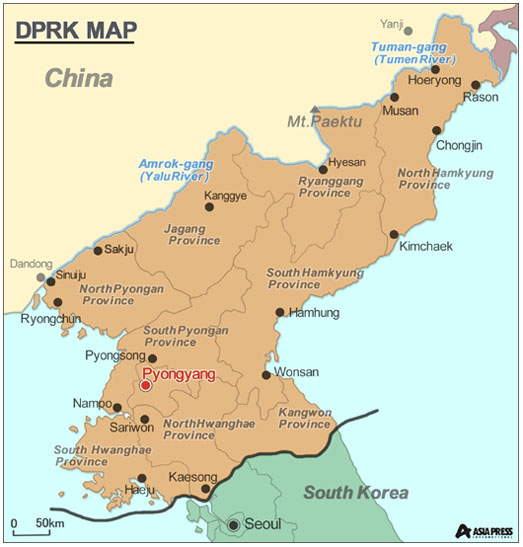
- <Investigation Inside N. Korea>Famine in the provinces : “Many people have died from the start of May due to starvation and disease…” (2) Workers can’t go to work due to malnutrition…even at the DPRK’s largest iron mine
- <Investigation Inside N. Korea>Famine in the provinces : “Many people have died from the start of May due to starvation and disease…” (1) The state’s food supplies have hit rock bottom
- The Pyongyang Cultural Language Protection Act calls for execution of violators in a bid to eliminate South Korean style speech from the DPRK
- <Inside N. Korea>Violent young people form brotherhoods, causing fights to break out between different gangs…The authorities crackdown on young people who try to earn money outside of their assigned workplaces
- <Investigation> The authorities start crackdowns based on the Pyongyang Cultural Language Protection Act (2) “People using South Korean style speech are being arrested”…ASIAPRESS asks its reporting partners about the crackdown
